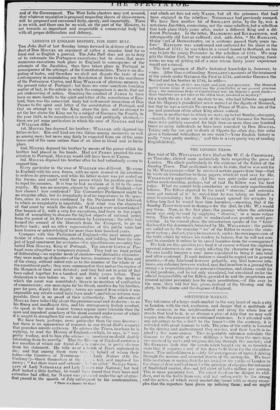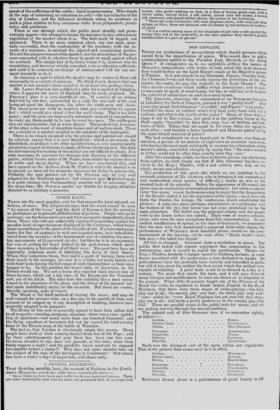s et ral FIELD MARKET.
THE tolerance of a large stock-market in the very heart of such a city as London, with the riot, confusion, and danger that a multitude of cattle occasion in the neighbourhood and along the whole line of streets that lead to it, is so strange a piece of folly that we may well inquire into the causes of its continued existence. Is it attended with any advantage to the spiler ? to the buyer?—On the contrary, it is al fended with great damage to both. The price of the cattle is lowered by the driving and maltreatment they receive, and their health is injured I v the same causes. Two respectable salesmen calculate the damage to the cattle at three shillings a bead from the mere in;11ries received by carts and waggons (hiving through the market ; and Mm'. GIBLETS finds that. the beasts when bought are in so feverish a slate that it requires a rest of ten days to tit them fmthe slaughterhouse. This unhealthiness is solely the consequence of hurried driving through the narrow and crowded streets of the metropolis. We have little hesitation in saying, that the tax levied on the public of London in the shape of dear and bad meat for the privilege of enjoying the nuisance of Smithfield market, does not fall short of half a million per annum. This is mere pecuniary los§. We might dwell on the danger to children, and to the feeble from age, and not onfreqaently to the strong and the active, of which every market-day teems with so Many examples that the reporters have given up noticing them ; and we might speak of the sufferings of the cattle ; but it is unnecessary. Who stands in the way of redressing so notorious an evil ?—the tax-collector of the city of London, and the dishonest landlords whom its existence in such a place enables to levy enormous rents from pickpockets, prostitutes, and publicans. There is one attempt which the public must steadily and perseveringly oppose —the attempt to lessen the nuisance by any extension or regulation of the market where it is. The limb must be lopped, not plastered. There is no more common cheat, nor, one more generally successful, than the confounding of the accidents with the essence of a nuisance, to mislead the injured and complaining parties. It is not the misgovernment of the market, nor the misconduct of the persons connected with it, whether these be great or small, against which we contend. The simple fact of its being where it is, however wise its regulations, and however strictly executed, is to us objection sufficient; and until it be removed, no change of management will for one moment reconcile us to it.
In choosing a spot to which the market may be removed, there will necessarily be a variety of opinions. We think it very obvious that one market is not enough—there ought to be at least two, perhaps three. Mr. LEWIS Pocoex has published a plan for a market at Islington, where it appears ten acres of freehold may be easily procured. Mr. Pococies plan is a very inartificial one. It consists of an oblong field 850 by 500 feet, surrounded by a wall, the one half of the area being set apart for sheep-pens, the other for cattle-pens and sheds. The sheep-pens are 1440 in number, each pen containing 81 square feet ; which would give about 4 feet for each sheep. This is too little space ; 'and the pens are improperly arranged—instead of one pathway to every six, there ought to be one to every two pens. The cattle-pens also are objectionable, but in a less degree. The great defect, however, of the plan, is the want of slaughter-houses and of feeding-sheds. These are essential to a market situated in the outskirts of the metropolis.
There is no reason assigned why the precise spot pointed out should be selected, except that it is near Smithfield ; which is no reason, for Smithfield, in addition to its other qualifications, is very inconveniently situated inrespect of distance to many of those who frequent it. The data for determining the locating of the market are not difficult to obtain. It is only necessary to ascertain the distance and direction of the different points, within twenty miles of St. Pairs, from which the various droves of cattle and sheep deploy. When we have ascertained this, and have agreed on the distance from St. Paul's at which the market is to be placed, we have all the elements necessary for fixing its precise site. Probably the spot pointed out by Mr. Pococx may be very well adapted for the Northern market ; but whatever spot be pitched upon, it is quite obviotis that Parliamentary sanction will be necessary. In the mean time, Mr. POCOCK merits our thanks for keeping attention directed to so salutary a measure.



















 Previous page
Previous page